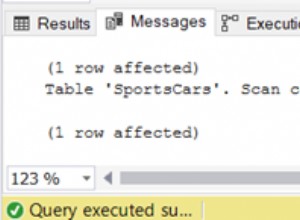J'ai fait quelques améliorations dans le JOIN version; voir ci-dessous.
Je vote pour l'approche JOIN pour la rapidité. Voici comment je l'ai déterminé :
AVOIR, version 1
mysql> FLUSH STATUS;
mysql> SELECT city
-> FROM us_vch200
-> WHERE state IN ('IL', 'MO', 'PA')
-> GROUP BY city
-> HAVING count(DISTINCT state) >= 3;
+-------------+
| city |
+-------------+
| Springfield |
| Washington |
+-------------+
mysql> SHOW SESSION STATUS LIKE 'Handler%';
+----------------------------+-------+
| Variable_name | Value |
+----------------------------+-------+
| Handler_external_lock | 2 |
| Handler_read_first | 1 |
| Handler_read_key | 2 |
| Handler_read_last | 1 |
| Handler_read_next | 4175 | -- full index scan
(etc)
+----+-------------+-----------+-------+-----------------------+------------+---------+------+------+--------------------------------------------------+
| id | select_type | table | type | possible_keys | key | key_len | ref | rows | Extra |
+----+-------------+-----------+-------+-----------------------+------------+---------+------+------+--------------------------------------------------+
| 1 | SIMPLE | us_vch200 | range | state_city,city_state | city_state | 769 | NULL | 4176 | Using where; Using index for group-by (scanning) |
+----+-------------+-----------+-------+-----------------------+------------+---------+------+------+--------------------------------------------------+
Le 'Extra' précise qu'il a décidé de s'attaquer au GROUP BY et utilisez INDEX(city, state) même si INDEX(state, city) pourrait avoir du sens.
AVOIR, version 2
Le faire passer à INDEX(state, city) donne :
mysql> FLUSH STATUS;
mysql> SELECT city
-> FROM us_vch200 IGNORE INDEX(city_state)
-> WHERE state IN ('IL', 'MO', 'PA')
-> GROUP BY city
-> HAVING count(DISTINCT state) >= 3;
+-------------+
| city |
+-------------+
| Springfield |
| Washington |
+-------------+
mysql> SHOW SESSION STATUS LIKE 'Handler%';
+----------------------------+-------+
| Variable_name | Value |
+----------------------------+-------+
| Handler_commit | 1 |
| Handler_external_lock | 2 |
| Handler_read_key | 401 |
| Handler_read_next | 398 |
| Handler_read_rnd | 398 |
(etc)
+----+-------------+-----------+-------+-----------------------+------------+---------+------+------+------------------------------------------+
| id | select_type | table | type | possible_keys | key | key_len | ref | rows | Extra |
+----+-------------+-----------+-------+-----------------------+------------+---------+------+------+------------------------------------------+
| 1 | SIMPLE | us_vch200 | range | state_city,city_state | state_city | 2 | NULL | 397 | Using where; Using index; Using filesort |
+----+-------------+-----------+-------+-----------------------+------------+---------+------+------+------------------------------------------+
JOIGNEZ-VOUS
mysql> SELECT x.city
-> FROM us_vch200 x
-> JOIN us_vch200 y ON y.city= x.city AND y.state = 'MO'
-> JOIN us_vch200 z ON z.city= x.city AND z.state = 'PA'
-> WHERE x.state = 'IL';
+-------------+
| city |
+-------------+
| Springfield |
| Washington |
+-------------+
2 rows in set (0.00 sec)
mysql> SHOW SESSION STATUS LIKE 'Handler%';
+----------------------------+-------+
| Variable_name | Value |
+----------------------------+-------+
| Handler_commit | 1 |
| Handler_external_lock | 6 |
| Handler_read_key | 86 |
| Handler_read_next | 87 |
(etc)
+----+-------------+-------+------+-----------------------+------------+---------+--------------------+------+--------------------------+
| id | select_type | table | type | possible_keys | key | key_len | ref | rows | Extra |
+----+-------------+-------+------+-----------------------+------------+---------+--------------------+------+--------------------------+
| 1 | SIMPLE | y | ref | state_city,city_state | state_city | 2 | const | 81 | Using where; Using index |
| 1 | SIMPLE | z | ref | state_city,city_state | state_city | 769 | const,world.y.city | 1 | Using where; Using index |
| 1 | SIMPLE | x | ref | state_city,city_state | state_city | 769 | const,world.y.city | 1 | Using where; Using index |
+----+-------------+-------+------+-----------------------+------------+---------+--------------------+------+--------------------------+
Uniquement INDEX(state, city) est nécessaire. Les nombres de Handler sont les plus petits pour cette formulation, donc j'en déduis que c'est le plus rapide.
Remarquez comment l'optimiseur a décidé par lui-même quelle table commencer, probablement à cause de
+-------+----------+
| state | COUNT(*) |
+-------+----------+
| IL | 221 |
| MO | 81 | -- smallest
| PA | 96 |
+-------+----------+
Conclusion
JOIN (sans l'inutile t tableau) est probablement le plus rapide. De plus, cet index composite est nécessaire :INDEX(state, city) .
Pour revenir à votre cas d'utilisation :
city --> documentid
state --> termid
Mise en garde :YMMV, car la distribution des valeurs pour documentid et termid peut être très différente de celle du cas de test que j'ai utilisé.




